Visits in this Issue:
|
Tolosa Winery
Baileyana & Tangent Wineries
Loring Wine Company
Alma Rosa Winery & Vineyards
Foxen Winery & Vineyard
Kenneth Volk Vineyards
Stolpman Vineyards & Winery
Presidio
Trio (DiBruno /Curran /Badge)
Ampelos Cellars
Ken Brown Wines
Tablas Creek Vineyard
Calcareous Vineyard
Four Vines Winery
Linne Calodo
Dover Canyon Winery
Halter Ranch Vineyard
Edward Sellers Vnyds & Wines
Booker Vineyard
Penman Springs Vineyard & “The Wines Formerly
Known as Redline”
|
In-depth winery visits are always a fun and
educational experience, but I also enjoy simple visits to
winery tasting rooms. Dropping in without too many particular
plans allows me to make as many or as few stops along the
way as I feel like making, and also gives me a better idea
of what wineries are pouring for typical visitors.
Aside from
a few pre-arranged winery visits on this trip, I did a little
planning ahead and picked some possibilities that sounded
like they'd be interesting places to visit, while others were
spur-of-the-moment stops along the way. Traveling to the Central
Coast after Thanksgiving is becoming a yearly tradition for
me, and as I had a couple of obligations through the first
weekend of December, I hit the road the following Monday.
| Monday
- December 3, 2007 |
Tolosa Winery
Tasting Notes:
'06 Sauvignon Blanc: made in all stainless
steel, grapefruit/citrus and mildly grassy aromas and
clean citrus flavors
'06 Chardonnay, "No Oak": cool temperature
fermentation in stainless steel, about 40% went through
malolactic, subdued citrus aromas, some mild leesy notes
add interest, a touch of minerality in the finish
'06 Chardonnay: about 90% fermented in oak, 30% new,
about 2/3 went through malolactic, richer than the "No
Oak", but still displaying citrus aromas with some
tropical fruit and vanilla/oak notes.
'05 Pinot Noir, Central Coast: 20% new oak, medium-light
color, very pretty floral and red fruit aromas, cherry,
tea leaf and spice flavors, great value at $18
'05 Pinot Noir: aged for 11 months in oak, 30% new,
darker than "Central Coast", more raspberry
and tea leaf with vanilla overtones
'05 Pinot Noir, "1772": top Pinot, barrel
selection with about 50% new oak, medium red color,
similar to regular bottling but more intense aromas
and flavors, and adding a nice hint of orange peel
'04 Merlot: medium-dark color, light cherry and slightly
smoky oak aromas, medium-bodied and mild tannins
'04 Syrah: 20% new oak, dark color, black fruit aromas
with white pepper and herb overtones, nice mouthfeel,
not overly tannic, another QPR winner at $16.
'04 Heritage Blend: a co-fermented blend of 68% Syrah
and 32% Grenache, dark fruits, herbs, touches of smoke
and spice, firm tannins
'05 Late Harvest Sauvignon Blanc: from botrytised grapes,
14% RS, fig and tart orange aromas, pleasant but not
exceptional |
I'd gotten a late start driving south from Oakland, so I
had time for only a couple of stops before continuing to Lompoc,
where I was staying for a couple of nights. I'd never visited
Tolosa and I decided to make that my first stop. The tasting
room was in a recently-built facility set in the midst of
vineyards in the heart of Edna Valley. All the wines are made
from estate Edna Valley fruit. Most of the fruit from their
700+ acre Edna Ranch vineyard is sold to other wineries, while
Tolosa is able to take their choice of fruit. Planted mostly
to Chardonnay and Pinot Noir, small blocks of other varieties
are grown there as well.
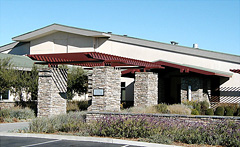 |
Tolosa's first wines were produced
in 1998, and their current production is around 20,000 cases
per year. The tasting room itself has a sleek modern feel
to it – lots of metal and glass, not the rustic woodsy
look so popular with many wineries. Traci was handling the
pouring duties behind the long glass tasting bar when I visited,
and I was able to sample ten wines she had open that day.
Overall, Tolosa has a very nice lineup of wines, with a couple
of particular standouts in the sub-$20 category. I was particularly
impressed with the lively acidity present in nearly all the
wines, reflecting the cool climate of the vineyard site.
Baileyana & Tangent Wineries
|
Tasting Notes:
'06 Tangent Viognier, Paragon Vineyard: nice floral,
lemon, and stone fruit aromas, very pleasant
'06 Tangent Pinot Gris, Paragon Vineyard: pear / apple
aromas, good acidity, somewhat clipped finish
'04 Baileyana Gewürztraminar, Central Coast: seemed
tired and over-the-hill, not showing much
'01 Baileyana Syrah: 95% Paso Robles, 5% Firepeak Vineyard,
subdued plummy fruit with some black pepper notes
'04 Baileyana Grand Firepeak Cuvée Syrah, Firepeak
Vineyard: unfortunately oxidized (perhaps the bottle
had been open a few days?), though some dark fruit and
meat aromas poked through
'03 Baileyana "Trenza", California: 49% Syrah,
34% Merlot, 13% Cabernet Sauvignon, 4% Petite Sirah,
fruit sources range from Napa Valley to Santa Barbara
County. Dark fruit aromas with hints of cedar and smoke,
moderate tannins |
With time for one more stop in Edna Valley, I headed to the
tasting room shared by Baileyana Winery and their sister winery,
Tangent. Their tasting room is in the historic Independence
Schoolhouse, a familiar site along Orcutt Road in Edna Valley
and formerly the tasting room for Seven Peaks.
Owned by the
Niven family, who founded Paragon Vineyard in the valley in
1973, Baileyana focuses mainly on Chardonnay, Pinot Noir,
and Syrah. The newer Tangent label produces exclusively white
wines other than Chardonnay, and bottles all their wines in
screwcap. The Tangent wines are made entirely in stainless
steel and without malolactic fermentation. In recent years,
Baileyana has developed its own estate vineyard, Firepeak,
named for the chain of extinct volcanoes starting from coastal
Morro Rock and extending into Edna Valley.
Burgundian native
Christian Roguenant has been Baileyana's winemaker since 1999,
and now makes the Tangent wines as well (he also makes wine
for several other labels, including Alma Rosa). Their recently-constructed
winery is large enough to accommodate the target production
of 25,000 cases, as well as to allow several other wineries
to do custom crush there. I'd heard good things about Baileyana's
recent wines, and the Tangent concept intrigued me, but this
visit was ultimately somewhat disappointing. I got the impression
that they were trying to clear out some older wines from the
tasting room, and they weren't pouring any Pinot at all. I'd
like to return and taste a better representation of their
current wines one of these days.
Continuing south to Lompoc, I decided to drive along scenic
Santa Rosa Road, where the late afternoon light helped create
a dramatic view across the Santa Ynez River to Sea Smoke Vineyard
on the steep hillside beyond. As I knew I would be in the
Santa Barbara wine country on a Monday evening, I couldn't
resist setting up a dinner at the Hitching Post in Buellton
for their Monday burger night. I was joined by John &
Cindy Tomasso, Dave & Becky Corey with their young sons
Fletcher & Nolan, Peter Cargasacchi, and Brian Loring.
Dinner at the Hitching Post never disappoints, and with delicious
burgers, lots of good wine on the table, and great company,
this was a fun and memorable evening.
| Tuesday
- December 4, 2007 |
Loring Wine Company
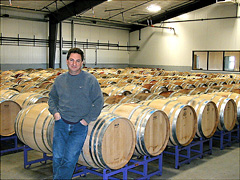 |
At dinner the previous night, Brian Loring had invited me to visit him at the
brand new facility his winery shares with Pali Wine Company,
and the next morning I took him up on his offer. The building,
not far from his previous location on the north side of Lompoc,
was still undergoing finishing touches, but Brian was able
to move into the space during the 2007 crush. Brian's portion
of the building is over 20,000 square feet, allowing him a
true luxury for a winery – being able to arrange all
his barrels in a single layer on the floor. Of course, that
was the case when he moved into his previous building too,
so we'll see how long this lasts…… Although the
building is on the utilitarian side in terms of design, it
does include some cool features such as ozone stations at
several locations throughout the interior, plus a useful feature
his previous facility lacked…...floor drains! Since
Brian's '07 wines are in an awkward phase that every Pinot
seems to go through a few months after crush, we decided it
would be best to hold off on barrel tasting. So after a quick
tour of the new building, I was on my way again.
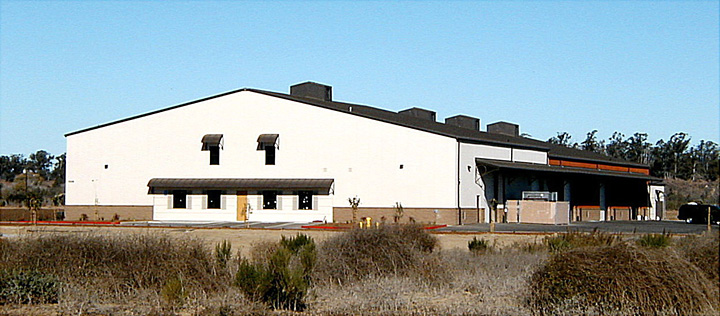 |
The new Loring Wine Company building |
Alma Rosa Winery & Vineyards
I'd hoped to stop at Foley Winery along Highway 246 not far
from Lompoc, but found the tasting room was closed for the
day due to updating their computer system. So I continued
on through Buellton and headed back along Santa Rosa Road
to the tasting room for Alma Rosa. I'd tasted their wines
earlier in the year, but I wanted to stop by, since they had
moved in July from their temporary "Camp Alma Rosa"
tasting room in Buellton back to what had been the old Sanford
tasting room.
Tasting Notes:
'06 Pinot Gris, Santa Barbara County: from a vineyard
near Los Alamos, lightly floral and stone fruit aromas,
zingy acidity
'06 Pinot Blanc, Sta. Rita Hills: made in stainless
steel with no malolactic, pear and apple aromas with
hints of spice and good balance between richness and
acidity. Very tasty!
'05 Chardonnay, El Jabali Vineyard, Sta. Rita Hills:
tropical fruit & citrus, medium-bodied, bright acidity
'05 Pinot Noir Vin Gris, El Jabali Vineyard, Sta. Rita
Hills: light salmon color, pleasant strawberry and spice
aromas, very refreshing
'05 Pinot Noir, Sta. Rita Hills: all from La Encantada
Vineyard, mostly 777, Pommard 4, and 115 clones, about
18% new oak. Exceptionally pretty aromas of rose petals,
red fruits, and spice, with lively acidity. This wine
might age nicely but it's so nice right now that there's
little reason to wait. In the 7-8 months since I last
tasted this wine it's really come together beautifully
and it was one of the highlights of my Central Coast
trip.
'05 Pinot Noir, La Encantada Vineyard, Sta. Rita Hills:
from 667 and Swan clones, aged in about 40% new oak,
darker fruit and more earthy than the SRH Pinot, more
in need of age to show its best |
Mel Lewis was behind the tasting counter, and
we were joined for awhile by winery owner Richard Sanford,
who was meeting with a couple of people about installing solar
panels at the facility. It's always a pleasure to talk with
Richard, and his dedication to sustainable, organic farming,
green building methods, and other environmentally-conscious
goals shows through in everything he says and does. Alma Rosa's
two vineyards along Santa Rosa Road, 7-acre Rancho El Jabalí
(adjacent to the tasting room) and 100-acre La Encantada Vineyard
are both certified organic. Most of the two vineyards are
planted to Pinot Noir, with smaller plantings of Chardonnay,
Pinot Blanc, and Pinot Gris. Alma Rosa's wine is made by Christian
Roguenant in Edna Valley. The wines are all beautifully crafted,
and it was great to be back in that familiar and funky old
wood structure tasting the wines of Richard Sanford there
again.
Foxen Winery & Vineyard
Tasting Notes:
'05 Chenin Blanc, Wickenden Vineyard: straw & apple/pear
aromas, good balance of mouthfeel and acidity
'06 Chardonnay, Tinaquaic Vineyard: apple and tropical
fruit aromas and flavors, rich yet clean and refreshing
'06 Pinot Noir, Santa Maria Valley: fruit sourced from
80% Bien Nacido and 20% Riverbench vineyards, bright
red fruits, tea leaf, spice, with hints of mushroom
and earth
'06 Cuvee Jean Marie, Williamson-Doré Vineyard:
60% Grenache, 20% Syrah, 20% Mourvedre, dark fruits
& spice, medium tannins, long finish
'04 Merlot, Vogelzang Vineyard: ripe cherry / vanilla
aromas, rich mouthfeel with some spicy oak in the finish
'05 Sangiovese Volpino: 72% Sangiovese, 28% Merlot,
earthy cherry, medium-bodied with moderate tannins,
very pleasant |
 |
I'd wanted to visit the Kenneth Volk Vineyards tasting room,
in the facility that used to house Byron Winery at the mouth
of Tepusquet Canyon. I called the tasting room to find out
if the dirt road that crosses the usually-dry Sisquoc River
was open that day (it's often washed out and closed during
the winter, resulting in a time-consuming detour to cross
the river). After learning that it was open, I headed north
on scenic Foxen Canyon Road. Seeing that there were no cars
parked outside often-crowded Foxen Winery, I decided to pop
in for a quick visit. I had visited there earlier in the year,
and was happy to see that they were pouring new vintages of
their wines this time.
Kenneth Volk Vineyards
Tasting Notes:
'06 Pinot Grigio, Sierra Madre Vineyard, Santa Maria
Valley: made in stainless steel, citrus aromas with
a bit of spice and juicy acidity
'05 Chardonnay, "Jaybird", Santa Maria Valley:
another unoaked Chard – "naked as a Jaybird"
– moderate tropical fruit aromas with bright acidity
'05 Chardonnay, Estate: from 25-30 year old vines, much
richer than "Jaybird" with prominent vanilla/spice
notes
'06 Malvasia Bianca, San Bernabe Vineyard, Monterey
County: very floral, "sweet" aromas but actually
dry, stone fruit and spice in the flavors, good acidity,
very nice.
'05 Pinot Noir, Santa Maria Cuvee, Santa Barbara County:
blend from Bien Nacido, Garey, Nielson, Sierra Madre,
and Solomon Hills vineyards, red fruits and rhubarb
with touch of earth, smooth mouthfeel and mild tannins
'03 Merlot, Paso Robles: smoky black cherry aromas,
medium-bodied with moderate tannins
'05 Merlot, Rancho Sisquoc Vineyard: bigger wine than
Paso Merlot, sweet ripe cherry and vanilla aromas and
flavors
'04 Tempranillo, John Smith Vineyard, San Benito County:
slightly floral and herbal notes with tangy red fruits,
firm tannins
'05 Negrette, Caleri Vineyard, San Benito County: very
dark color, intense brambly fruit with some peppery
notes, not overly tannic |
A familiar name in a new venture – Kenneth Volk was
the founder and long-time owner/winemaker at Wild Horse Winery
in Templeton. He sold Wild Horse in 2003, and the following
year he purchased the old Byron Winery from the Robert Mondavi
Corporation. Having worked with Santa Maria Valley fruit in
the past – his first commercial wine release at Wild
Horse was a 1983 Pinot from the area – it was an easy
transition for him to make.
 |
The first wines from the new Kenneth
Volk Vineyards label were released in 2006. Although the focus
of the new winery is on vineyard-designated wines from Santa
Barbara County, there are also a number of wines from Paso
Robles fruit (mostly Cabernet and Merlot) and a handful from
Monterey and San Benito Counties. And as he did at Wild Horse,
Volk continues to make some wines from grape varieties that
don't get a lot of attention in California – Malvasia
Bianca, Tempranillo, and Negrette among them. Steve Hunter
was pouring wines at the small tasting room counter the day
I visited. The winery has about 20 bottlings in current release,
and I had a chance to taste most of the varieties they produce.
The day was warm and sunny – getting into the upper
70s, it was surprisingly warm for December. After driving
back down Foxen Canyon Road, I enjoyed one of my favorite
lunch places, Los Olivos Grocery, just off Highway 154 on
the east side of town. Their specialty sandwiches are yummy,
and when they're grilling tri-tip for sandwiches on their
outdoor barbeque – well, that's hard to beat!
Stolpman Vineyards and Winery
Tasting Notes:
'05 "Poetry in White": 85% Sauvignon Blanc,
10% Roussanne, 5% Viognier, aromatics are dominated
by the Sauvignon Blanc, easy-to-drink style of white
'04 "Poetry in Red": Syrah/Sangiovese blend,
blackberry/plum with herbal and mocha notes, moderate
tannins
'04 Sangiovese: cherry/strawberry and spice aromas,
medium-bodied with nice acidity
'03 Nebbiolo: medium color, black cherry and herbs,
powerful tannins, needs plenty of time
'05 Estate Syrah: with about 5% Grenache, bright plummy
fruit, medium-rich mouthfeel and good acidity
'05 Hilltops Syrah: 90% new oak, racked onto Roussanne
lees after about 12 months for aromatics and texture,
darker fruit than estate, spicier, more full-bodied
and tannic, structured for aging – excellent! |
Solvang, a few miles south of Los Olivos, has a tacky tourist-trap
side to it, but in recent years it has also become home to
a number of wine bars and tasting rooms. One of the best of
these is the tasting room for Stolpman.
Their eponymous vineyard in
Ballard Canyon (in the Santa Ynez Valley AVA) provides fruit
to a number of other wineries in addition to their own. Syrah,
Sangiovese, Nebbiolo, Sauvignon Blanc, Roussanne, Grenache,
Cinsault, and Merlot are among the varieties grown there.
The 220-acre estate was first planted in 1992, and is farmed
by renowned vineyard manager Jeff Newton and his Coastal Vineyard
Care Associates.
Stolpman winemaker Sashi Moorman, who formerly
worked with Adam Tolmach at Ojai Vineyards, makes the wine
at their facility in the Lompoc industrial park known as the
“Wine Ghetto”. Stolpman’s wines seem to
walk the line between power and finesse better than most wineries
that try to take that route, and they’re always a pleasure
to taste.
Presidio
Tasting Notes:
'06 Chardonnay, Estate: barrel fermented, 100% malolactic,
apple/spice aromas & flavors with oak overtones
'06 Viognier, Estate: neutral oak, shy aromatics, citrus
& floral notes, hint of minerality in finish
'06 Syrah Rose, Estate: whole-cluster pressed from earlier-harvested
cluster "wings", very light color, red berry
aromas, quite pleasant
'06 Gewurztraminer, Viento Vineyard, Monterey County:
made in stainless steel, intense lychee aromas, seems
slightly sweet, smooth finish
'06 Pinot Noir, Estate: from 115, 667, 777 clones, medium-light
color, cherry/spice aromas, along with some darker fruit
and earth in flavors, medium-bodied, very good acidity,
very nice
'04 Sangiovese, Hallauer Vineyard, Santa Ynez Valley:
black cherry aromas, spicy oak overtones with bright
acidity
'03 "Interlude", Napa Valley: 85% Cabernet
Sauvignon, 15% Cabernet Franc, muted dark fruit and
smoky oak aromas, a bit hard and closed on the palate
'04 Syrah, Hallauer Vineyard, Santa Ynez Valley: plum
aromas & flavors with overtones of earth and meat
and a touch of mocha
'04 Syrah, Estate: black pepper, meat, darker fruit
than SYV Syrah, full tannins, promising but needs time
'04 Port, Amador County: 52% Touriga Nacional, 22% Tinta
Cão, 26% Tinta Roriz, sweet, jammy plum and dark
fruit, smooth mouthfeel |
I was impressed with a couple of Presidio’s wines when
I’d tasted them at a wine event in 2006, so I was curious
about trying out a larger selection of their lineup. Their
tasting room, a short walk from Stolpman’s, is conveniently
right across the street from Mortensen’s Bakery, my
favorite place in Solvang for cookies and pastries.
 |
Presidio
founder and winemaker Doug Braun began his winery in 1991
using all purchased fruit but was not satisfied with the results,
so he established his own estate vineyard. Planted around
2000, Presidio’s biodynamically-farmed vineyard just
west of the Sta. Rita Hills AVA near Lompoc utilizes dense
vine spacing and a trellising system that keeps the fruit
zone of the vines close to the ground to take better advantage
of refracted heat in the cool climate. About 30 acres of the
property are planted with Chardonnay, Viognier, Pinot Noir,
and Syrah. The winemaking facility is a neighbor of Stolpman’s
in the Lompoc Wine Ghetto. For the most part, Presidio’s
estate wines were the most interesting of the lineup at the
tasting room, and it will be interesting to see how their
wines evolve over the next few years.
Trio (DiBruno / Curran / Badge)
Tasting Notes:
'06 Curran Gewurztraminer, Santa Barbara County: from
White Hills and Sanford & Benedict vineyard fruit,
made in stainless steel with no malolactic, totally
dry, moderate floral and spice aromas, very refreshing
'05 DiBruno Pinot Grigio, Sanford & Benedict Vineyard:
made in stainless steel with no malolactic, light color,
pear and spice aroma, moderately-rich mouthfeel
'06 DiBruno Pinot Grigio, Sanford & Benedict Vineyard:
similar to '05 but more intense aromas, not quite as
viscous with a bit more acidity and a touch of minerality
in the finish
'06 Curran Grenache Blanc, Santa Ynez Valley: from Camp
4 Vineyard, fermented cool in stainless steel, no malolactic,
ripe apple and spice aroma, smooth mouthfeel balanced
with crisp acidity
'04 DiBruno Sangiovese, Stolpman Vineyard: medium color,
cherry/vanilla aromas with earth and spice notes, good
acidity and moderate tannins
'05 Badge Pinot Noir, Sta. Rita Hills: from 60% La Encantada
& 40% Gaia Vineyard (the old Ashley's Vineyard,
dark fruit with lots of spice, medium-bodied with great
mouthfeel and finish, excellent. I thought at first
it might have some whole cluster fermentation because
of the very spicy character, but I was assured that
Bruno and whole cluster don't mix!
'04 Curran Syrah, Black Oak Vineyard: aged 18 months
in 75% new oak, blackberry and pepper aromas with spicy
oak overtones, not especially tannic |
Shortly before leaving on my trip, I'd heard that Kris Curran
and Bruno D'Alfonso had opened a new tasting room for their
wines in Solvang. The tasting room is called Trio, for the
three labels poured there – DiBruno, Curran, and Badge.
Bruno was the long-time winemaker for Sanford but left the
winery shortly after Richard Sanford did. He has consulted
with several other wineries in addition to making his own
DiBruno and Badge labels. DiBruno’s focus is on Italian
grape varieties while Badge makes Sta. Rita Hills Pinot Noir.
Kris recently became the winemaker for Foley Estates Winery and Lincourt Vineyards after a number of years as winemaker for Pinot specialist Sea Smoke, and her Curran label has also generated considerable interest over the past few years. In particular, Curran’s Grenache
Blanc has opened the eyes of a lot of people as to the possibilities
of that grape variety. I can attest that it’s a perfect
match with the delicious spicy food at Thai Cuisine in Lompoc!
When I arrived at Trio late in the afternoon, Kris, Bruno,
and their tasting room staff were having a photo session done.
Kris told me that they would be finished in about a half-hour
so I strolled around town for awhile and returned just as
the photo crew was packing up their gear. Of course, Kris
& Bruno's four beautiful German Shepherds were lounging
in the tasting room as well. After the regular tasting, Kris
& Bruno invited me to stick around to taste some of their
wines matched with some flavored chocolate they were considering
for their tasting room – there were some hits and misses
with the matches, but it was a memorable experience. I thought
all the wines were noteworthy, and this new tasting room is
not to be missed.
| Wednesday
- December 5, 2007 |
Ampelos Cellars
Tasting Notes:
'05 "Syrache", Santa Barbara
County: 27% Grenache, 73% Syrah from several vineyard
sources (Alisos, Byron and Bien Nacido), about 35% new
oak, aromas capture both brighter Grenache fruit and
darker Syrah character, with a touch of pepper. Smooth
mouthfeel, not tannic, should be good for early drinking
'05 Grenache "Delta", Byron Vineyard, Santa
Maria Valley: about 35% new oak, medium-dark color,
sweet cherry & strawberry aromas with hints of darker
fruit, moderate tannins
'05 Syrah "Gamma", Ampelos Vineyard, Sta.
Rita Hills: second Syrah harvest from estate vineyard,
combination of
99 and Estrella clones, fruit was destemmed,
about 35% new oak, medium-dark color, black cherry and
darker fruit aromas with touch of black pepper and mocha,
nice acidity, not too tannic |
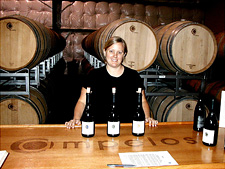 |
The next morning I made the short drive to the winery shared
by Ampelos Cellars and Ken Brown Wines, on the northwest edge
of Lompoc. I’ve visited Ampelos several times in the
past couple of years, but since I'd made an appointment to
taste with Ken Brown that morning I thought I’d contact
Ampelos and check out their latest wines too.
Peter and Rebecca
Work are the people behind Ampelos, and their wines continue
to impress. The Work’s daughter-in-law Lindsay, who’s
an integral part of the Ampelos team, met me at the winery
to taste their three most recent releases.
Ken Brown Wines
Tasting Notes:
'05 Chardonnay, Nielson Vineyard: using Wente clone,
from the oldest vineyard in Santa Barbara County, planted
in 1964, with which Ken has worked for well over 20
years, this was barrel-fermented with 100% malolactic
fermentation, in about 12% new oak. Apple and spice
aromas with a hint of tropical fruit in the flavors,
rich mouthfeel with very good acidity
'05 Pinot Noir, Sta. Rita Hills: a blend from 58% Mt.
Eden clone from Sanford & Benedict and 42% Pommard
clone from Clos Pepe, the grapes were 100% destemmed,
and the wine was aged for 15 months in about 30% new
oak. Medium color, black cherry & darker fruit with
some earthy character
'05 Pinot Noir, Cargasacchi Vineyard: entirely 115 clone,
100% destemmed, aged 17 months in about 45% new oak.
Medium-dark color, darker fruit character than SRH blend
along with earth & mushroom, full-bodied with moderate
tannins and mineral notes on the long finish. Very tasty!
'03 Syrah, Bien Nacido Vineyard: all Estrella clone,
about 40% new oak, very dark color, black pepper, savory
smoked meat, blackberry aromas, rich and tannic but
with very good balancing acidity, excellent cool-climate
Syrah |
It wasn’t too difficult to get to my
next winery visit…..I simply walked up the flight of
stairs to Ken Brown's office, where he had some of his current
releases out for tasting. After having visited the winery
a couple of times during busy open house events, it was nice
to be able to spend more time tasting and talking with Ken
about his wines.
One of Santa Barbara County's wine pioneers
(one of several famed winemakers to have worked at Zaca Mesa
Winery, and founder of Byron Winery in the early '80s) Ken
launched his own label in 2003 following the sale of Byron
Winery. Ken’s wife Deborah handles the business side
of the winery.
Ken Brown Wines currently has a yearly production
of about 2,500 cases, and Ken plans to keep production around
this level so he can have personal "hands-on" control
over the entire winemaking process. His long working relationship
with many of the most highly-regarded vineyards in Santa Barbara
County – Cargasacchi, Clos Pepe, Rio Vista and Sanford
& Benedict among them – has allowed him to find
and use the specific vineyard blocks that will lead to the
wines he wants to make. Ken uses "native" yeast
for fermenting his Chardonnay while his Pinots and Syrahs
are inoculated with specific yeast strains. Single vineyard
Pinots spend about 17-18 months in barrel while the blended
Pinots are typically in barrel for about 12 months. On Syrah,
Ken uses saignée to help concentrate the fruit flavors,
and délestage (rack & return) to reduce seed tannins.
This was a very impressive quartet of wines – the Chardonnay
was right up with the best I tasted on this trip, and the
Cargasacchi Pinot and Bien Nacido Syrah were exceptional as
well.
Before leaving Santa Barbara County, I stopped for lunch
at Panino in Los Olivos, just around the corner from the town's
charming main street. I'd heard how good their sandwiches
were but I'd never tried them before – mainly because
of the throng of people usually crowding the place. I managed
to get there at an uncrowded time, and it was well worth the
stop – terrific sandwich, and a nice place to relax
and watch people strolling up and down the street.
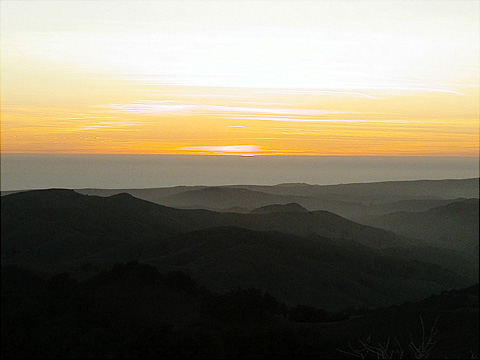 |
I spent the rest of the day doing some sightseeing as I made
my way from Lompoc up to Paso Robles, capped off by watching
a gorgeous sunset from the summit of Highway 46 between Cambria
and Paso, maybe the most spectacular viewpoint in the area.
Went to the bar at Villa Creek restaurant for a light dinner
– even when the restaurant itself isn't that busy, the
bar is always hopping and it's the place in Paso to spot winemakers.
I bumped into a couple of them at the bar that evening, Roger
Nicolas of RN Estate Vineyard and Amy Butler of Edward Sellers
Vineyard & Wines. I'd heard of Edward Sellers but had
not tasted their wines, and talking briefly with Amy convinced
me that I needed to stop by their tasting room the next day.
| Thursday
- December 6, 2007 |
Tablas Creek Vineyard
Tasting Notes:
'06 Côtes de Tablas Blanc: 59% Viognier, 32% Marsanne,
6% Grenache Blanc, 3% Roussanne, expressive floral /
stone fruit aromas, moderately rich mouthfeel with mineral
notes on the long finish. More Marsanne in this blend
than in previous years
'06 Esprit de Beaucastel Blanc: 65% Roussanne, 30% Grenache
Blanc, 5% Picpoul Blanc, apple and citrus aromas, complex
flavors include notes of honey and flowers, rich and
intense, long finish
'06 Rosé: 60% Mourvèdre, 28% Grenache,
12% Counoise, strawberry / raspberry with some spicy
notes
'05 Côtes de Tablas Rouge: 43% Grenache, 24% Mourvèdre,
18% Syrah, 15% Counoise, darker fruit aromas, plum,
earth, bright acidity with moderate tannins
'05 Mourvèdre: 90% Mourvèdre, 10% Syrah,
deep plum aromas, dark berry flavors with savory meat
and spice notes, good tannic structure
'04 Esprit de Beaucastel Rouge: 50% Mourvèdre,
27% Syrah, 17% Grenache, 6% Counoise, blackberry and
meaty aromas, medium-bodied with a touch of minerality
on the finish
'05 Esprit de Beaucastel Rouge: 44% Mourvèdre,
26% Grenache, 25% Syrah, 5% Counoise, similar character
to
'04 but noticeably more intense aroma and flavor,
maybe a bit more spice and brighter fruit character
than '04
'05 Vin de Paille: 34% Roussanne, 29% Grenache Blanc,
24% Viognier, 13% Marsanne, 262 g/L residual sugar,
stone fruit, floral, and almond aromas, not heavy, acidity
keeps the flavors lively
'04 Vin de Paille "Quintessence": 100% Roussanne,
153 g/L residual sugar, made from one barrel and given
extra barrel aging, very rich, intense apricot, honey,
and spice, long finish, outstanding dessert wine. |
In contrast to the warm weather in Santa Barbara County, the
morning was chilly as I drove west from Paso Robles along
curving Adelaida Road and soon reached Tablas Creek Vineyard.
Co-owned by the Perrin family (of Château de Beaucastel
fame) and Robert Haas (founder of Vineyard Brands importers),
the heart of Tablas Creek is its 120-acre organically-farmed
vineyard. On sloping hillsides of calcareous clay soil, the
vines are planted more densely – from 1,600 to 1,800
vines per acre – than at most California vineyards.
With its Beaucastel heritage, of course Tablas Creek specializes
in Rhône-style wines, and five white plus four red Rhône
grape varieties are grown in their vineyard. They also grow
small amounts of Vermentino and Tannat. Some of the vines
are head-pruned, in the style of Châteauneuf du Pape,
rather than trellised.
All of Tablas Creek's wines are made
with estate-grown fruit. They currently produce about 18,000
cases per year, and their ultimate target is around 20-25,000.
Whites are fermented with native yeasts, mostly in stainless
steel with some in neutral oak, while reds are fermented with
native yeasts in stainless steel tanks, then aged in 1,200-gallon
oak foudres. The Vin de Paille dessert wines are made in the
traditional way – the grapes are dried on straw mats,
then fermented and aged in new oak barrels. Tablas Creek is
a "must" stop for me whenever I'm in the Paso area,
and their elegant wines are as distinctive as any I've tasted
along the Central Coast.
Calcareous Vineyard
Tasting Notes:
'04 Chardonnay, York Mountain: barrel-fermented, 100% malolactic,
a big, rich wine that's well-made but seems more about the
smoky oak/vanilla from the barrels than the hints of citrus-like
fruit
'05 Roussanne, Paso Robles: barrel-fermented in neutral and
one-year old oak, malolactic, medium-light color, bright stone
fruit with a bit of orange peel in the aromas, much less oak
influence than with the Chardonnay
'05 Viognier, Paso Robles: no malolactic on this wine,
fermented and aged in neutral oak, clean, subtle floral
and citrus aromas, nice acidity and some mineral notes
on the finish
'05 Pinot Noir, York Mountain: mostly from Carver Vineyard,
destemmed, native yeast, medium-light color, very pretty
aromas of dried cherry and rose petal, some earth and
spice overtones, bright acidity – very nice!
'05 Tres Violet, Paso Robles: 40% Mourvèdre,
30% Grenache, 30% Syrah, destemmed, inoculated yeasts,
blended prior to bottling, medium color, sweet vanilla,
earthy, subdued dark cherry and plum fruit, not very
tannic
'04 Twisted Sisters, Paso Robles: 51% Cabernet Franc,
19% Merlot, 16% Petite Verdot, 14% Cabernet Sauvignon,
destemmed, inoculated yeasts, blended prior to bottling,
medium-dark color, sweet vanilla, plum and darker berry
fruit, earthy, lightly herbal, touch of mint and spice
'04 Cabernet Sauvignon, York Mountain: a little Petite
Verdot is blended into this, dark fruits, slightly herbal,
some vanilla oak, lively acidity with some minerality
on the finish, moderate tannins
'02 Zinfandel, Paso Robles: bright, brambly berry fruit
with some pepper and spice notes, moderate tannin, very
nice
'03 Zinfandel, Paso Robles: from Westside vineyard that
Calcareous leases and farms, about 15% Syrah blended
in, raspberry and darker fruit, bigger and a bit oakier
than '02, more tannic
'05 Syrah, Paso Robles: from Kiler Canyon Vineyard,
medium-dark color, sweet plummy fruit with spice notes,
showing some smoky oak, not too tannic. |
I'd never visited Calcareous, but the name was intriguing
enough that I had to give it a try. Located at an elevation
of over 1,500 feet along beautiful Peachy Canyon Road in the
hills west of Paso Robles, Calcareous is a large estate, with
over 400 acres of land extending across a variety of soil
and climate types, though much of the soil is……you
guessed it – calcareous.
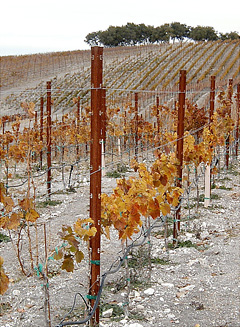 |
The winery was established
in 2000, and most fruit at this point is purchased from other
vineyards on the Westside of Paso. A good deal of fruit comes
from the tiny York Mountain AVA, in the hills just west of
the Paso Robles AVA – Calcareous manages the Carver
Vineyard there. Interestingly, the winery gets both Pinot
Noir and Cabernet Sauvignon from Carver Vineyard, a testament
to the different climate conditions in various parts of that
property. The winery currently produces about 7,500 cases
per year. Some of the wines were a bit more oaky than I prefer,
but they’re well-made, and surprisingly for this area,
the star was a Pinot Noir.
Four Vines Winery
Tasting Notes:
'06 "Naked" Chardonnay, Santa Barbara County:
one of the growing number of unoaked and non-malolactic
Chardonnays being produced in recent years, this is
sourced from the Los Alamos area of Santa Barbara County.
Light color, apple and straw aromas, crisp acidity with
hints of citrus in the flavors, very pleasant
'05 "Old Vine Cuvée" Zinfandel, California:
from a variety of sources, medium-light color, bright
wild berry fruit, touch of black pepper and sweet vanilla
oak, medium-bodied with smooth mouthfeel and moderate
tannins
'05 "Maverick" Zinfandel, Amador County: from
several Shenendoah Valley old-vine sources including
Deaver and Original Grandpère vineyards, small
amount of Syrah blended in, bigger, more concentrated,
darker fruit aromas and flavors with some sweet vanilla
oak, more tannic than the Old Vine Cuvée –
very hedonistic Zin!
'05 "The Biker" Zinfandel, Paso Robles –
from Dusi and Preston vineyards on Paso's Westside,
small amount of Mourvèdre blended in, darker
color, a bit more tart fruit than the "Maverick",
hint of dark chocolate, fairly tannic
'05 Syrah, Paso Robles: from Kiler Canyon and Lock vineyards,
black pepper and blackberry aromas, bit brighter fruit
and spice flavors with sweet oak overtones, smooth mouthfeel,
not very tannic |
Four Vines has been getting some good press lately and I wanted
to stop by their tasting room. The small space is easy to
miss, tucked around the corner from Cider Creek Bakery on
West Hwy 46.
Begun in 1996, Four Vines is a partnership headed
by winemaker Christian Tietje, and is known mainly as a Zinfandel
specialist. They source their Zin fruit from a number of regions
– Sonoma, Napa, Mendocino, Lodi, Amador, and of course
Paso Robles. They also make several other wines including
Chardonnay, Syrah, Barbera, and a number of blends, both traditional
and unusual – they call those their "Freakshow"
wines. Their '04 Petite Sirah, "The Heretic", made
the 2007 Wine Spectator Top 100. The "Naked" Chardonnay
and Old Vine Zinfandel Cuvée make up most of the 45,000
case annual production, while most of Four Vines' other wines
are made in much smaller quantities.
The wines remind me of
Linne Calodo with their full-throttle winemaking, unusual
Zin-Rhône blends, and fun wine names (others include
"Anarchy" and "Loco"). I stepped up to
the tasting bar to try some of their wines, keeping in mind
the motto featured on the bottle of their "Peasant"
Rhône-style blend: "Temperance, like Chastity,
is its own punishment".
Linne Calodo
Tasting Notes - from barrel:
'06 Sticks and Stones: Grenache-based blend (about 60%),
intense raspberry, some coffee/chocolate notes from
newer barrel, fairly tannic
'06 Rising Tides: combination of brighter and darker
fruits, very spicy (probably from new Hungarian barrel),
medium-bodied
'06 Nemesis: super dark color, dark fruits, very big
and rich
'06 Cherry Red: bright cherry and wild berry fruit with
hints of black pepper
'06 Leona's: a bit darker fruit than the Cherry Red,
some spice notes
'06 Outsider: bright raspberry, spice, smooth mouthfeel,
outstanding
'06 Mourvèdre: meat, game, leather/earth, classic
Mourvèdre character, quite tannic |
Linne Calodo is practically right next door to Four Vines,
so I figured I might as well pop in for a quick visit. I always
like to stop at Linne Calodo to taste their most recent wines,
and as often as not, I run into owner/winemaker Matt Trevisan
there. Sure enough, Matt was just about finished with topping
up barrels when I arrived, and it didn't take much arm-twisting
for him to convince me to do some barrel tasting with him
of some of his 2006 wines – so much for my "quick
visit"!
The '06 reds have been blended but are not yet
the final blends, as Matt will do some adjustments to them
prior to bottling. Overall, I thought the '06s were a bit
bigger with more tannic structure than Matt’s '05 wines.
Of the wines we tasted, the “Outsider” Zin/Syrah//Mourvèdre
blend seemed the most developed and tasty at this point, but
these are all still youngsters – they haven’t
even come out of their barrels yet!
Dover Canyon Winery
Tasting Notes:
'06 Viognier, Paso Robles: barrel-fermented in neutral
oak, very pretty stone fruit aromas, slightly sweet
citrus and peach flavors, smooth and clean finish
'05 Roussanne, Starr Ranch, Paso Robles: barrel-fermented
in neutral oak, melon and stone fruit aromas with intriguing
notes of earth and lees, rich mouthfeel
'05 "Che Vita da Cane", Paso Robles: 75% Sangiovese,
20% Cabernet Sauvignon, 5% Syrah, "it's a dog's
life", sourced from Nona Vineyard near San Miguel,
dark fruits, earthy, meaty, with moderate tannins
'03 Cabernet Sauvignon, Hansen Vineyard, Paso Robles:
blackberry and coffee aromas, medium-bodied, tannic
'05 Cabernet Sauvignon, Jimmy's Vineyard, Paso Robles:
black cherry, plum, mocha, richer mouthfeel, young and
tannic
'05 "Alto Pomar", Paso Robles: 60% Syrah,
22% Grenache, 18% Mourvèdre, bright plum with
savory roasted meat and spice notes, nice acidity
'06 "Cujo" Zinfandel, Paso Robles: bright
cherry, raspberry, black pepper notes, big wine, medium
tannins |
Just a mile or so up Vineyard Drive from Linne Calodo is Dover
Canyon. The sky was darkening with clouds as I reached the
top of Dover Canyon's steep driveway, where a small barn-like
building houses their tasting room. Partners Dan Panico and
Mary Baker run the winery, which was launched in 1997.
Dan,
who had previously been the winemaker at Eberle, handles the
wine production, while Mary, with a background in wine hospitality
and business management, takes care of winery administration
(and also writes for the Appellation America website in her
spare time).
Winemaking stresses vineyard character, with
use of mainly neutral oak and sometimes native yeast. Their
own small vineyard features rocky, calcareous soil, where
they grow some Syrah and head-trained, dry-farmed Zinfandel.
Sustainable farming is important to Dover Canyon, and in addition
to fruit from their own vineyard, they choose to purchase
fruit only from other vineyards with similar farming practices.
Unusual among vineyards, Dover Canyon's is also a certified
national wildlife habitat. With a total production of only
about 2,500-3,000 cases per year, most of the wines are very
limited and tend to sell out quickly.
Dan (another one, not
Panico) was pouring at the tasting bar. While I was tasting,
both Dan Panico and Mary popped in for a few minutes before
running off to attend to other things. While it had been a
few years since I'd last stopped at Dover Canyon, this visit
convinced me that I need to stop and taste there more often.
Halter Ranch Vineyard
Tasting Notes:
'06 Ranch White: 47% Viognier, 35% Sauvignon Blanc, 14% Roussanne, 10% Marsanne, half aged on stainless steel and half in neutral oak, mild floral and citrus aromas, good acidity
'06 Viognier: with 10% Roussanne blended in, fermented in stainless steel, aged in neutral oak, bright peach, apricot, and spice, rich mouthfeel
'05 Ranch Red: blended from 7 varieties, led by Zinfandel and Syrah, aged in neutral oak, red berry aromas with intriguing hints of cinnamon and other spices, smooth finish with mild tannins
'04 Ranch Cab: 75% Cabernet Sauvignon, 10% Petite Verdot, 9% Cabernet Franc, 6% Syrah, 30% new oak, bigger wine than Ranch Red, plum, currants, smoky, full-bodied and fairly tannic
'04 Cabernet Sauvignon: 80% Cabernet Sauvignon, 9% Cabernet Franc, 8% Malbec, 3% Merlot, 40% new oak, currants and darker fruit, pepper, smoother than Ranch Cab, moderate tannins
'04 Syrah: 76% Syrah, 14% Mourvèdre, 8% Grenache, 2% Petite Verdot, 40% new oak, dark fruit aromas with notes of spice, coffee and vanilla, medium tannins |
I'd driven by Halter Ranch earlier in the day – it's almost right next to Tablas Creek – but had gotten there before opening time, so I returned late in the afternoon, just as a rainstorm began to roll in. The Halter Ranch tasting room is in a pretty setting next to the 120-year old Victorian-style farmhouse of the original ranch. The vineyard was begun in 1996 and has now expanded to 250 acres, planted to 17 Bordeaux and Rhône grape varieties, along with Zinfandel. 900 acres of the original ranch, including the vineyard land, were purchased in 2000 by Swiss-born Hansjörg Wyss.
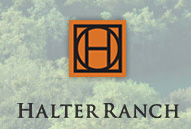 |
The first grapes from the vineyard were all sold to other wineries, while Halter Ranch began producing their own wines beginning in 2004. Currently making only about 5,000 cases per year, most of the estate fruit still goes elsewhere. The tasting room was completed in 2005. The hillside vineyards reach as high as 1,800 feet in elevation. Soil types in the vineyard include calcareous clay and clay loam with shale and sandstone deposits, not unlike the greatly varied soils seen throughout the Westside of Paso Robles. Halter Ranch is working toward having their vineyard certified as organic. Lovely Solane was at tasting bar, and she took me through all of the winery's current releases. They struck me as well-made wines with very good acidity across the board.
Edward Sellers Vineyards & Wines
Tasting Notes:
'05 Roussanne, Paso Robles: from
Denner and Halter Ranch vineyards, zingy citrus with
some mineral notes on finish
'06 Blanc du Rhône, Paso Robles: 46% Marsanne,
27% Viognier, 15% Roussanne, 12% Grenache Blanc, all
Westside fruit except Viognier from Fralich Vineyard,
more full-bodied than Roussanne, apple, melon, and spice
aromas and flavors
'06 Viognier, Paso Robles: from Fralich Vineyard, lightly
floral aromas with citrus overtones, medium-bodied with
some interesting lees character
'06 Grenache Rosé, Paso Robles: 96% Grenache,
3% Syrah, 1% Marsanne, cranberry and cherry flavors,
bright acidity
'04 Cognito, Paso Robles: 41% Mourvèdre, 22%
Grenache, 22% Zinfandel, 15% Syrah, bright cherry, wild
berry, spice, earth notes, smooth mouthfeel, not very
tannic
'04 Grenache, Paso Robles: 85% Grenache, 10% Mourvèdre,
5% Syrah, ripe cherry and plum, a touch of spice, mild
tannins
'05 Vertigo, Paso Robles: 70% Grenache, 17% Mourvèdre,
13% Syrah, similar to Grenache but with more earthy
Mourvèdre character and bigger tannins
'05 Le Thief, Paso Robles: 59% Syrah, 23% Grenache,
13% Mourvèdre, 5% Cinsault, dark fruit character,
with sweet vanilla and smoky oak overtones
'05 Syrah Sélectionée, Paso Robles: dark
fruits, plum, and spice, rich mouthfeel and medium tannins |
The daylight was fading fast as I left Halter Ranch for the
drive back to Paso Robles, and by now the rain was picking
up as well. Rolling into town and finding a parking space
close to Edward Sellers' downtown tasting room, I dodged the
raindrops and hurried inside. Winery owner Ed Sellers, with
a background in real estate and health care, purchased a 28-acre
property just south of Highway 46 a few miles west of town,
in the Templeton Gap area, in 2004. The land is still being
developed, with 10 acres of vines now planted. Plans are in
the works for a winery and tasting room on the property, and
possibly a bed-and-breakfast inn to follow.
Up-and-coming
winemaker Amy Butler has guided the wine production from the
start. Until the estate vines mature and the winery is completed,
wines are made at the Denner facility entirely from purchased
fruit, mostly sourced from Paso's Westside. The winery's first
vintage was 2004, and they currently produce about 5,000 cases
per year, with a goal of reaching about 10,000 cases. With
the advantage of being open later than most wineries, the
downtown tasting room, opened in early 2007, was busy even
as the time neared 6pm. Kendall at the tasting counter poured
the wines – a very impressive lineup, and definitely
a new winery to watch.
I'd planned to have dinner with Augie Hug and his wife Raquel,
but as often seems to be the case, Augie's "real"
job interfered at the last minute and he was delayed by a
day in getting back to Paso. But Raquel was able to join me
for dinner, and her recommendation of Chico's Café,
a new seafood restaurant on the south side of the Paso Robles
city park, was spot-on. A small, informal place, the food
was terrific – yet another restaurant find in Paso!
| Friday
- December 8, 2007 |
Booker Vineyard
| Tasting Notes:
From bottle:
'06 Booker White: 65% Roussanne, 35% Viognier, made
in stainless steel and neutral oak, half destemmed and
pressed after 3 days, half whole-cluster pressed, going
for more minerality and less upfront fruit, stone fruit
aromas with hints of orangepeel, rich mouthfeel and
clean finish
'05 "Remnant": Syrah, Cabernet Sauvignon,
Cabernet Franc and Petit Verdot, 100% new oak (mostly
tight-grain Taransaud), very dark color, currant and
dark fruits with vanilla and spice notes, tannic
'05 "Vertigo": 90% Syrah, 10% Grenache, named
for the steep vineyard slope, bright sweet blackberry
fruit with mocha notes, medium-full mouthfeel and moderate
tannins
'05 "Fracture": 100% Syrah, named for the
fractured vineyard rocks, huge black wine with loads
of depth and structure, upfront ripe plum and darker
fruit with overtones of smoked meat and vanilla, and
firm tannins
From barrel:
'06 "Ripper": 90% Grenache, 10% Syrah, from
new Taransaud puncheon, sweet bright cherry fruit, big
upfront fruit, tannic
'06 "Remnant": about 95% Syrah and 5% Cabernet
Sauvignon, from François Frères barrel,
much more Syrah character than '05
'06 "Vertigo": from Boutes puncheon, big ripe
blackberry fruit, bright acidity
'06 "Fracture": from Ermitage barrel, huge
sweet dark fruits and spice, fairly tannic
|
I had arranged a visit with Eric Jensen of Booker Vineyard,
and I was happy to see that the previous night's rainstorm
had ended by the time I drove out to the vineyard and winery
a few miles west of Paso Robles.
The vineyard is north of
Highway 46, and just south of L'Aventure's estate vineyard.
Booker Vineyard, owned by Eric & Lisa Jensen, takes its
name from Claude and Dick Booker, longtime Paso Robles residents
who had once owned and farmed the land, and who became noted
local philanthropists.
The vineyard rolls across rocky hillsides, with 42 acres
currently planted. Only about six years old, Booker Vineyard
already produces Cabernet Sauvignon, Cabernet Franc, Petite
Verdot, Malbec, Tempranillo, Syrah, Grenache, Mourvèdre,
Roussanne, and Viognier. Eric only takes a small amount of
the fruit for his own winery – most is sold to other
wineries, including Saxum, Linne Calodo, Villa Creek, Pax,
and L'Aventure among others. Considering the size of the vineyard,
it's amazing that Eric farms it alone for most tasks. He's
committed to sustainable farming, though the vineyard is not
certified as organic. He's experimenting with different cover
crops for planting between the rows of vines.
I hopped into Eric's pickup truck so he could give me a closer
look at his vineyard. Driving up some of the steep slopes,
rocks of calcareous shale and siliceous shale that form the
basis of the thin soils are scattered throughout. The soft
rock fractures easily – a fact that was demonstrated
clearly after I brought home a vineyard rock and accidentally
dropped it about 4 inches onto the cargo mat in the back of
my car, and the rock shattered into a dozen small pieces.
The low vigor of the soils was evident in looking at the vines
– many looked stunningly small and thin for 5-6 year-old
vines. Most of the vineyard is planted on a dense 7'x3' row
spacing.
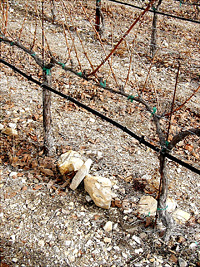 |
Eric had made wine with Justin Smith of Saxum and Stephan
Asseo of L'Aventure for a number of years before stepping
out on his own. The 2005 release is Booker's first, with a
white and four reds. About 1,200 cases were made, and Eric
wants to keep production small to suit his hands-on winemaking
style. In addition to his own wines, he does some custom crush
winemaking in his facility. All reds are destemmed but Eric
said that he might experiment with some whole cluster fermentation
in Syrah and Mourvèdre in the future. He prefers to
let his fruit express itself in the wines, and tries to keep
the winemaking in the background – no acidulation, no
filtering, minimal use of sulfur. Favorite coopers include
Ermitage, François Frères, and Taransaud, and
future plans are to introduce more puncheons for aging the
reds. Wines are blended early in the year following harvest.
Plans are to keep most reds in barrel for 2-3 years and in
bottle for 1 year prior to release, with the exception of
the "Ripper" (Grenache), which will have 14-16 months
in barrel and 6 months in bottle. Eric is considering doing
an early and a later bottling of some wines, to see what the
effects of this will be.
After spending some time with Eric, he seemed to be in perpetual
motion – a useful characteristic to have when farming
a 42-acre vineyard on your own – and his passion was
clear when he talked about his vineyard and wines. His wines
are bold expressions of his vineyard, and they will certainly
appeal to fans of similar-style wines such as Saxum, Villa
Creek, and L'Aventure. His Booker wines are off to a great
start, and I expect we'll see more notable wines from him
in the future.
Penman Springs Vineyard & “The Wines
Formerly Known as Redline”
Tasting Notes
- from barrel:
Penman Springs:
’07 Dry Muscat: floral aromas, orange blossom, rich
mouthfeel
’07 Syrah Rosé: crushed, soaked overnight and
then pressed, medium-light color, wild berry, spicy, refreshing
’06 Reserve Cabernet Sauvignon: ripe dark berry aromas,
spicy rich mouthfeel, not too tannic, will be in barrel until
spring ‘09
’05 Reserve Cabernet Sauvignon: dark color, dark fruits
with vanilla and spice notes, smooth and elegant
’06 Petite Sirah: very dark, a bit reduced, deep blueberry
aroma, dense, big chewy tannins
“The Wines Formerly Known as Redline”:
’05 Eaglepoint Ranch Vineyard Syrah: dark color, bright
blackberry aroma, touch of vanilla oak
’05 Cedar Lane Vineyard Syrah: lots of white pepper
aroma, dark fruit flavors, mineral note in finish
’05 Penman Vineyard Syrah: blackberry, earth, hint of
herbs, smooth finish |
Before leaving Paso Robles and heading back home, I stopped
briefly to visit Larry Roberts at Paso Robles Wine Services,
a few miles northeast of town. Larry is the winemaker at Penman
Springs Winery, and also makes his own wine. He had launched
his own Redline label a couple of years ago with three very
good '04 Syrahs, but future releases will most likely come
out under a different (and as-yet undecided) label. Established
in 1996, Penman Springs produces Chardonnay, Muscat Blanc
(both dry and late harvest), Cabernet Sauvignon, Merlot, Syrah,
Petite Sirah, and a Bordeaux-style red blend. Their vineyards,
on the east side of Paso Robles, date back to 1981. Larry
took a short break from topping up barrels to taste through
a few barrels with me.
After saying goodbye to Larry, I hit the road and drove back
up Highway 101 to the Bay Area, wrapping up another relaxing
trip to the Central Coast. In addition to hitting some favorite
wineries, I revisited a couple that I hadn't stopped at for
several years and made my first visits to a number of others.
As always, I found the winemakers and tasting room staffs
alike to be exceptionally friendly in this part of California
wine country, and several places that were fairly new to me
beg for some in-depth visits in the future. Thanks to everyone
that I visited for being so generous with their time and their
wine. With the number of new wineries I see popping up all
over the Central Coast each year, I always wonder how they'll
be able to carve out their own niches in the wine market –
but tasting the distinctive and high-quality wines coming
from many of them, I say keep 'em coming!
|
